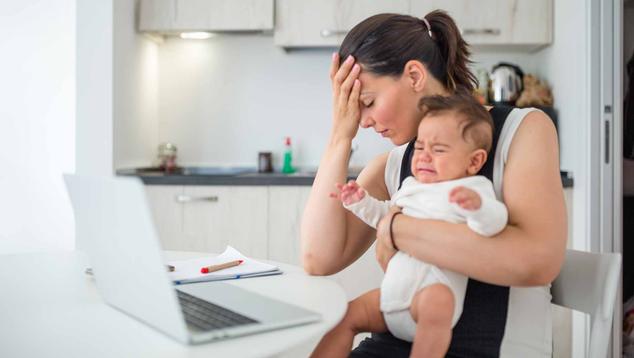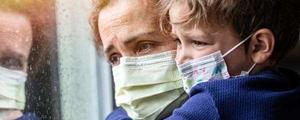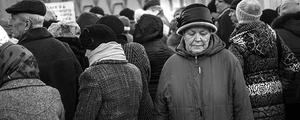Story Highlights
- Women with young children at home most stressed, sad, angry, worried
- Women and men with young children are in distress in almost every region
WASHINGTON, D.C. -- The world in the first full year of the COVID-19 pandemic was a sadder, angrier, more worried and more stressed-out place than it has been at any point in years, according to Gallup's latest Negative Experience Index, which annually tracks these emotions worldwide.
But in 2020, as they were in 2019 and to a lesser extent in other years, women with young children at home were by far the saddest, angriest, most worried and stressed out of all. And on top of the emotional weight they were shouldering, many were also likely to be in physical pain.
The Negative Experience Index, which is a composite score of each of these experiences, edged up to a new high of 37 among women with children younger than 15 at home. However, the blame for the increase doesn't rest entirely on the pandemic. Even in the years leading up to the COVID-19 pandemic, women with young children at home tended to have higher scores on the index than most groups, including men who have young children at home.
But notably in 2020, the index score for women with young children at home -- as well as women and men without children -- rose, while scores among men with young children at home stayed flat at 32.

Line graph. 2017-2020 trend lines in Negative Experience Index scores for women and men who do or do not have children younger than 15 living at home.
This is not to say that men with young children in the home have not been under pressure. In nearly every region of the world in 2020, women and men with young children in the home were more likely to post higher index scores than their counterparts who don't have young children at home.
The only exceptions in 2020 were among men in Commonwealth of Independent States countries, Northern America and Australia/New Zealand -- where men without young children were slightly more likely to report negative experiences.
| Women with young children |
Women without young children |
Gap | |
|---|---|---|---|
| % | % | pct. pts. | |
| Australia/New Zealand | 31 | 25 | 6 |
| Northern America | 40 | 34 | 6 |
| East Asia | 31 | 26 | 5 |
| Middle East/North Africa | 46 | 41 | 5 |
| Southeast Asia | 34 | 30 | 4 |
| Sub-Saharan Africa | 35 | 31 | 4 |
| European Union | 32 | 29 | 3 |
| South Asia | 40 | 38 | 2 |
| Latin America | 43 | 41 | 2 |
| Commonwealth of Independent States | 26 | 25 | 1 |
| Men with young children |
Men without young children |
Gap | |
| Northern America | 26 | 30 | -4 |
| Commonwealth of Independent States | 19 | 20 | -1 |
| Australia/New Zealand | 22 | 23 | -1 |
| European Union | 27 | 26 | 1 |
| East Asia | 29 | 27 | 2 |
| Latin America | 35 | 33 | 2 |
| Sub-Saharan Africa | 34 | 31 | 3 |
| Southeast Asia | 31 | 27 | 4 |
| South Asia | 34 | 29 | 5 |
| Middle East/North Africa | 42 | 37 | 5 |
| Gallup World Poll, 2020 | |||
Last year was a record-setting year for negative emotions, with stress levels reaching their highest points in 15 years. Stress levels for everyone rose to new highs, including among women with young children in the home, whose levels were slightly higher than the global average of 40%.

Line graph. 2017-2020 trends in stress levels worldwide among men and women with and without children younger than 15 in the home.
Worry also gained steam around the globe in 2020, among everyone but men with young children at home. Worldwide, nearly half of women with young children at home (45%) said they experienced worry during a lot of the previous day, outpacing men with young children at home (40%), women without young children at home (40%) and men without young children at home (36%).

Line graph. 2017-2020 trends in worry levels worldwide among men and women with and without children younger than 15 in the home.
Sadness also continued to tick upward worldwide in 2020, except among men with young children at home, who were actually slightly less likely to say they experienced sadness during a lot of the previous day. As is fairly typical, women with young children at home were the most likely of all to report feeling sadness, with 33% saying they had experienced this. Women without young children were the next-most-likely, at 29%, followed by men with young children (26%) and lastly men without young children (22%).

Line graph. 2017-2020 trends in sadness levels worldwide among men and women with and without children aged younger than 15 in the home.
Anger rose among all groups in 2020. In most years, women and men with young children at home have been substantially more likely to report being angry than those with no young children at home. But even among the former group, women were more likely than men to report being angry a lot. The gender gaps between men and women have been small or nonexistent among those without children.

Line graph. 2017-2020 trends in anger levels worldwide among men and women with and without children aged younger than 15 in the home.
Physical pain was the only negative experience that saw a decline between 2019 and 2020. Women and men with children were more likely to say they experienced pain than their counterparts -- with roughly one in three of each saying they experienced pain a lot -- but all groups of men and women saw these numbers fall.

Line graph. 2017-2020 trends in physical pain levels worldwide among men and women with and without children aged younger than 15 in the home.
Bottom Line
While 2020 was a record-setting year for negative emotions, the world was already heading in a negative direction well before the pandemic swept the world. But it undoubtedly compounded situations for many, including women with young children in the home, who were already dealing with these negative experiences. This may have implications on their ability to rebound after the pandemic.
To stay up to date with the latest Gallup News insights and updates, follow us on Twitter.
Read more about the world's emotional health in the Global Emotions 2021 report.





